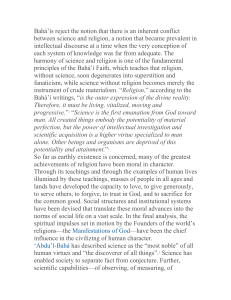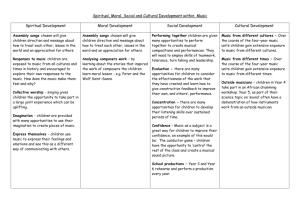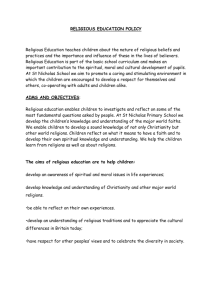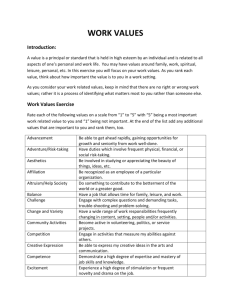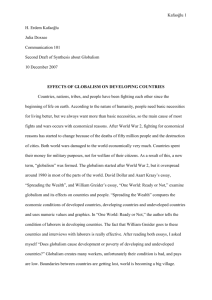Values_Ed_and_IT_in_age_of_Globalism
advertisement
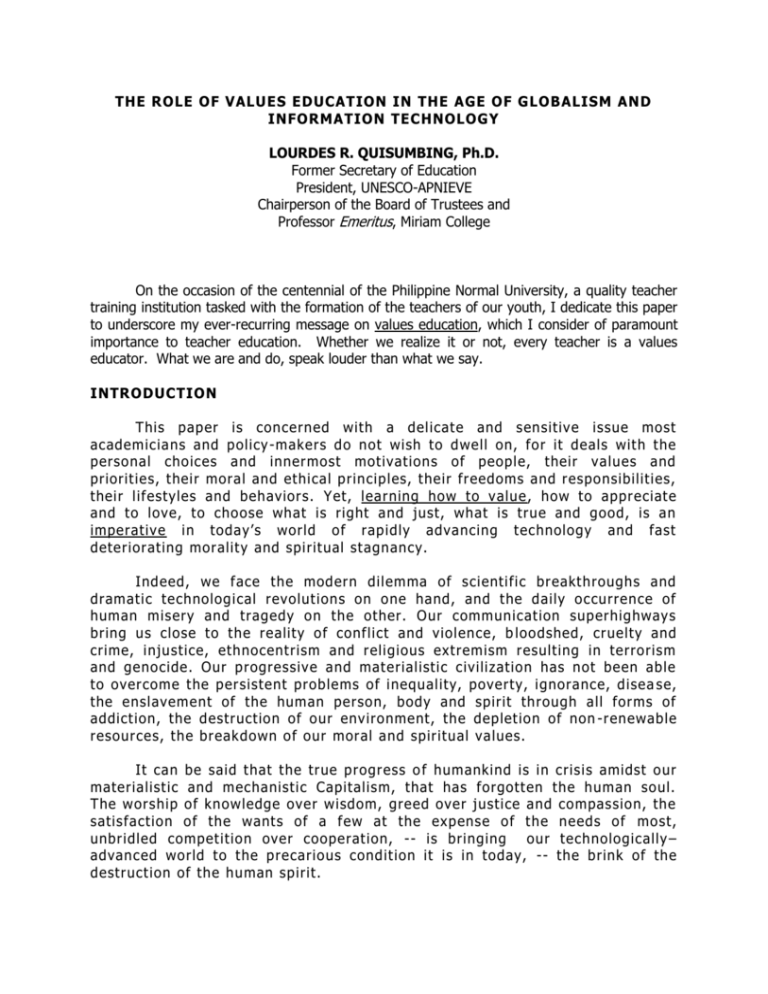
THE ROLE OF VALUES EDUCATION IN THE AGE OF GLOBALISM AND INFORMATION TECHNOLOGY LOURDES R. QUISUMBING, Ph.D. Former Secretary of Education President, UNESCO-APNIEVE Chairperson of the Board of Trustees and Professor Emeritus, Miriam College On the occasion of the centennial of the Philippine Normal University, a quality teacher training institution tasked with the formation of the teachers of our youth, I dedicate this paper to underscore my ever-recurring message on values education, which I consider of paramount importance to teacher education. Whether we realize it or not, every teacher is a values educator. What we are and do, speak louder than what we say. INTRODUCTION This paper is concerned with a delicate and sensitive issue most academicia ns and policy -makers do not wish to dwell on, for it deals with t he personal choices and innermost motivations of people, their values and priorities, t heir moral and ethical principles, their freedoms and responsibilities, their lifestyles and behaviors. Yet, learning how to value , how to appreciat e and to love, to choose what is right and just, what is true and good, is an imperative in today’s world of rapidly advancing technology and fast deteriorating moralit y and spiritual stagnancy. Indeed, we face the modern dilemma of scientific breakthroughs and dramatic technological revolut ions on one hand, and the daily occurrence of human misery and tragedy on the other. Our communication superhighways bring us close to t he reality of conflict and violence, b loodshed, cruelty and crime, injustice, ethnocent rism and religious extremism resulting in terrorism and genocide. Our progressive and materialistic civilization has not been able to overcome t he persistent problems of inequality, poverty, ignorance, disea se, the enslavement of the human person, body and spirit through all forms of addiction, t he destruction of our environment, the depletion of non -renewable resources, the breakdown of our moral and spiritual values. It can be said t hat t he true progress o f humankind is in crisis amidst our materialist ic and mechanistic Capitalism, that has forgotten the human soul. The worship of knowledge over wisdom, greed over justice and compassion, the satisfaction of the want s of a few at the expense of the needs of most, unbridled compet ition over cooperation, -- is bringing our technologically – advanced world to t he precarious condition it is in today, -- the brink of the destruction of the human spirit. The victory of technological civilization has instilled a sp iritual insecurity in us. Its gifts enrich, but enslave as well. As is finally reduced to self -interest, a struggle for mat erial things; but an inner voice tells us that we have lost something noble and pure, elevated and fragile. We have ceased to see the real purpose of our lives. Spirit ual and moral development has become stagnant; moral and ethical values have been eroded. The soul is dry. Surfeit brings wit h it a nagging sadness of the heart. Having allowed our want s to grow unchecked, (we want more and more) we are now at a loss where and how to direct them. We find no true fulfillment, And we never shall… unless the trials and tribulations of our century have taught us a few things to hand over to the next generation. Perhaps we can begin by asking ourselves a simple question, while admitting even if only in a whisper, but not only to ourselves, our blindness. In this business of life at breakneck -speed, - what we are living for? It should be come immediately clear to us, that Higher Educat ion faces tremendous and increasingly more complex problems and challenges as we prepare our students to become professionals and the leaders of the fut ure. Yes, indeed, today we have to deal with the problem of EQUITY, DEMOCRAT IZATION of ACCESS, to serve the higher demands of more and more who wish to pursue college or university education, to make higher education or specialized training available to all, including culturally -diverse populations, and the economically or physically disadvantaged. We have to b e concerned with the need for QUALITY and COMPETENCE to meet the rising levels of expectations and requirements of a changing job landscape. We have to be RELEVANT, FUNCTIONAL, FLEXIBLE and CREATIVE to enable our graduates t o survive and develop in a rapi dly -changing environment. We have to provide opportunities towards LIFELONG EDUCATION for ALL. VALUES EDUCATION FOR TODAY’S W ORLD I agree that the above valid concerns must be seriously addressed, but I also believe that our first priority s to help o ur students to become fully HUMAN PERSONS, with minds that can think clearly and critically, with hearts that can love and care deeply, and with wills that can decide to act freely and responsibly. This means, we have to enable our students how to value, to choose among alt ernatives, and to translate knowledge and skills into pract ice. This is what is referred to when we speak of VALUES EDUCATION, neglected component in today’s education. Indeed, VALUES EDUCATION which is the heart of all education, should be an integral part of a holistic education t hat develops all the human faculties of intellect, emotions and will: That it is not simple matt er to introduce it in the school curriculum is no reason why we should not try. There are many misconceptions r egarding VALUE S EDUCATION. A relatively new field in the behavioral sciences, it has a cognitive base with an affective element which finds its expression in behavior. One cannot deny t hat values are a powerful motivating force in one’s life, because they have th e power to t ranslate knowledge and skills into practice. Values development embraces more than the formal subjects of Religion and Ethics. It enables the student not only to know and understand norms and rules of conduct, but to accept and treasure them as guides to decisions and life -choices. It does not prescribe or dictat e, but leads the learner to discover and to commit oneself to chosen ideals and values. It t eaches one how to prioritize, to reflect on t he consistency bet ween one’s values and be havior, to evaluate, to reinforce or to modify. Since Values Education requires different approaches and strategies, its methodology varies from that of content subjects or skills training. Hence, values educators have to be trained or re -trained, admini strators re -oriented, curriculum mat erials developed, research carried out. Universally recognized and shared values have to be situated in the socio -cultural milieu of the learner and adapted to t he person’s needs and ex periences. Value sources abound i n the cultural heritage and traditions of humankind and of each specific group; in their histories and accumulat ed achievement s, as t hey too are found in the living contemporary present, in daily life and occurrences, as well as in the people’s aspirations and dreams of a preferred fut ure. The world’s great religions, the belief and normative systems of cult ural groups as well as universally shared and common values of humankind, - such as respect for Human Rights and Fundamental Freedoms, Truth, Just ice a nd Peace, Security and Liberty, Life, Health, Love and Happiness, are rich sources of values education. The complexity and difficult y of introducing t he values dimension in education is not insurmountable. It is feasible to int egrate values in the formal c urriculum since every subject area has a value component or to introduce it as a separate course, where values as motivations and mainsprings of human behavior are dealt with in a total cognitive -affective-experiential approach. The saying that values a re caught rather than taught is a truism. We all know too well that personal ex ample, not precepts, is the best teacher and t hat the values educator to be effective has to be a role model, for one teaches more by how one lives than by what one says. VALUES for GLOBALISM and the INFORMATION REVOLUTION Today, people are beginning to view globalism as a trend in t he relationships of nations and their citizens with one another towards interdependence and solidarity. They envision a global village mad e possible by the increasing ex change of information, current events, views, and opinions, free trade, common ent erprises, agreements, treaties, and networks through the information and communication superhighways that crisis -cross the globe. Our universit ies today are in hurry to adapt the curriculum to the trends and goals of their respective national economies/democracies towards Globalism, to produce graduat es who have competitive advantage in knowledge and skills required in the global market, who ar e functional in the global arena. Van Steenbergen (1994) suggest a new stage of global ecological citizenship and Sakamoto (1994) announces the beginning of the age of global democracy. In truth, t here has been a great progress on the universalization of human rights and democracy, on t he liberalization of trade and commerce, but there is also a widening gap between the ideal as enshrined in international document s and agreement s, and the pract ices of the real world. In too many places, we see cruelty and inhumanity inconceivable in this modern enlight ened age, and the outlook to reverse the trend is not too promising. The rights of fut ure generations are at stake. The way we live today does not guarant ee t heir survival and development . Even in deve loped countries, t here is widespread discontent. Chomsky (1994) hold a vision of democracy’s slow death as a de facto world government takes shape, by and for the rich. Globalism gradually leads to a superculture, a monoculture imposed by the powerful a nd the rich, threatening the existence of diverse cultures and depriving us of the wealth of our cultural diversity, of the contributions of nat ions less materially developed but possessed of valuable spiritual and cultural heritage the world can learn fr om – unless we learn and teach the values of tolerance and mutual respect, of acceptance and appreciation of “t he other”, of openmindedness, of harmony and peace. Educators should be able to identify the main tensions central to t he problems of the fut ure which pose great risks and grave threats to the freedom of the human person and of society. Jacques Delors in his Commission’s Report to UNESCO on Education for the Twenty -first Century writes about t he tensions between: the global and the local : how to become world citizens without losing one’s roots and while continuing to play an active role in the life of t heir nation and local community; the universal and the individual : as cultures become gradually globalized the risks of forgetting and ignor ing the unique character of human beings, their right to choose their own future and to achieve their full potential in t he cont ext of their own rich cultures and traditions; tradition and modernity : how to adapt to change without losing the past, how to assimilate scientific progress without losing one’s freedom and cherished values; long-term and short-term considerations : how to balance the over abundance of transient information and emotions, and the dependence on quick answers and ready solutions, - with the need for well -thought of, carefully-planned, concert ed and negotiated strategy for reform, which requires time and patience; the need for opportunity; the knowledge and information revolution and the c apacity of human beings to assimilate, to reflect and to discern, to choose, t o accept or to reject; and, lastly, the spiritual and the material , for the world, without realizing it, has a longing for deep human, ethical and spiritual values. competition and the concern for equality of A related phenomenon today is the rapid expansion of information and communication technologies. This on -going revolution may have faster and greater impact t han any of the past technological advances humankind has ever known. The world is being transformed from an i ndustrial to an information society. Computer t echnology, telecommunications, and satellites are already revolutionizing t he economy, production, consumption and trade, as well as our cultural values, tast es and habits, our forms of entertainment and lifes tyles. What their effects on education and learning of our youth, on lifelong education, on cultural diversity and pluralism, on citizenship and governance, on the moral, et hical and spiritual fiber of peoples around the globe, - is a serious matt er to pon der about . From print to elect ronic media, instant rapid information holds its viewers especially the young as captive audiences, all their senses glued tot he tube, so to speak, rendering them vulnerable to the onslaught of views, sounds and images dictat ed by powerful conglomerates who, knowingly or unknowingly, control the thinking, judgments, emotions and values of a susceptible public who are unprepared to sift and evaluate information, to weigh alternatives, to form reasoned opinions, and to make int elligent and free decisions. The “City of Byt es” is sketched as the new capital of the 21 s t Cent ury. Some view the increasing globalization of communication as facing the risk of cultural homogenization, t he rise of a monoculture swallowing up the world’s diverse cultures. Others fear the existing gap between the info -rich and the info -poor may widen and lead to further imbalances between developed and less developed countries, leading to a new type of exclusion. Already in 1980, the MacBride Report stat ed that the rapid increase of the volume of information and entertainment has brought about the homogenization of different societies, and people have become more cut -off from the society in which they live. And what about the int ernet and the e -mail? They have revolutionized our modes of learning and communicating. They have opened wide avenues of knowledge, expanded horizons as never before, bridged distances, overcome the barriers of t ime and space. Yet, untold risks and dangers abound, especially for the young. Who care and who sees to it that their young minds and hearts, their needs and problems, their rights and sensibilities are taken into consideration? Who protects the right to privacy and decency? Who safeguards intellectual properties? The issue of t he uses and challenges raised by the internet was discussed by the Execut ive Board of UNE SCO in its 150 t h Session in October 1996. It was recognized t hat the internet is “a revolution that changes our vision of things,” and that t he issue is not merel y technical, but also ethical, including aspects of intellectual property and confidentiality; that the new information technologies are already affecting people’s lives in many important ways; and that UNESCO will take t he lead in reflecting on legal, eth ical and societal issues while maintaining t he “free flow of information and ideas” as a top priority. CONCLUSION Indeed, information technology is a two -faced coin. As it informs and spreads knowledge, it can form and transform us or it can destroy a nd deform the humanity in us. What ever opinions are expressed about the pros and cons of the new revolution, there is a common emerging realization that technology should accommodat e itself to t he needs and capabilities of humanity, and not the other way around, that is should be guided by a genuine concern for the rights of all, the development of the present and protection of generations to come. Thus, technology is not of itself beneficial or harmful. It is a tool invented and developed by human creat ivity and industry. Its real worth depends on t he use we make of it. It should not therefore suppress other forms of communication t hat creat e a sense of community and enhance human ingenuity, aest het ics and art, culture and religion. The right to informat ion and communication, to data security and confidentiality, to participation in policy and decision -making, should be recognized and safeguarded. It should prot ect the morals and consciences of young people from being warped by gross immorality, unbridled pornography, and violence. It should be guided by a balanced and reasonable policy which recognizes both the right of access to information as well as the right to select or to reject communication technology. Part icular att ent ion should be given to the f act that simulated or virtual realities are not actual realities. Those are educative aspects to be considered to form part of t he planning and policy -making activities of IT. It behooves us, educators, to promote reflection on the societal and individual impacts, both positive and negative, of the new information and communication technologies, to develop those values that ensure the safeguarding of the rights and welfare of their users, present, and future, and to foster their pot ential for t he advancem ent of education, science, culture, democracy and peace. Colleagues and part ners in education, let us stop worshipping at the alt ar of high-tech. Its value is only instrumental and has to be judged by how efficiently and effectively it promotes the welfa re of the human person, his physical and economic well -being as well as his deep ethical, moral and spiritual values. Let us be concerned to make our students not merely smart , but also good. Let us strive for moral excellence, alongside with academic excellence. Let us educat e the whole person, and recognize that values education is the heart of all education which is human, holistic and democratic, progressive and modern, yet respectful of differences, tolerant and appreciat ive of diversity, - for t hese a re t he ingredients we need to transform our culture of violence to a genuine and sust ainable culture of peace. I end by asking these questions: Does IT make us more human, more capable of thinking clearly and critically, of loving and caring more deeply, or does it make us more like a machine? Will IT be a tool for transforming our culture of violence t o genuine culture of peace, where people love and care for each other, accept and cherish each other’s uniqueness and differences, and learn to live t oget h er in peace and in harmony? Or will it sharpen and widen the great divide bet ween t he haves and the have nots, the info -rich and the info -poor, the powerful and the downtrodden, the masters of the future and those that have no voice, no face, and no count in shaping their own destiny? Colleagues in educat ion, I am afraid I have left you with more questions than answers. But for the sake of the future generations, we must have the courage, the will and the commitment to grapple with these problems, face t h e challenges, and search for solutions. MAIN REFERENCES: 1. FUTURESCO, A UNE SCO bulletin for future -oriented literature. “The Futures of Human Right s and Democracy,” No.5, June 1996 2. FUTURESCO, “Impact and Future Challenges of the New Communicat ion Technologies,”No.6, October 1996 3. Learning: The Treasure Within, Jacques Delors, UNESCO, 1996 4. Information Technology: A Policy Workshop. UNESCO National Commission of the Philippines and Asian -Institute of Technology, Quezon City, Metro Manila, 25-26 July 1996 5. Natio nal Congress on Continuing Education, Pasig City, Metro Manila, 24 -25 October 1996 6. UNESCOPRESEE, November 14, 1996 7. Aleksander Sholt zshemitsyn, cited by Adrian Cristobal, the Philippine Daily Inquirer, March 27, 1997 8. Lourdes R. Quisumbing, “Teacher Educatio n for the New Millennium.” Paper read at the Philippine Normal University International Conference on Educat ion, January 9 -11, 2001, Manila.
